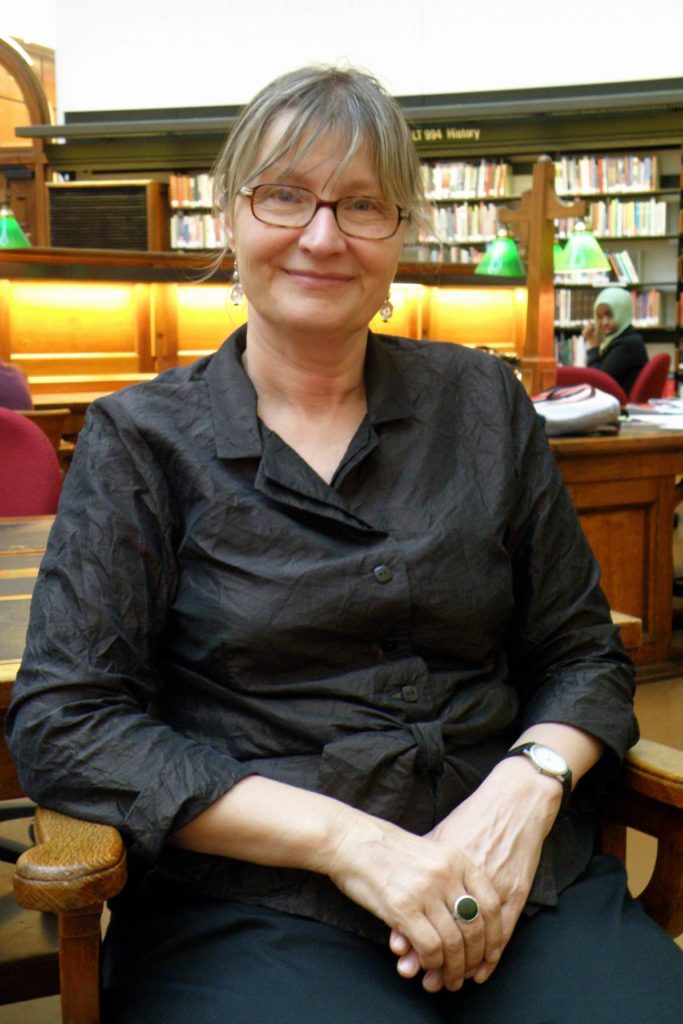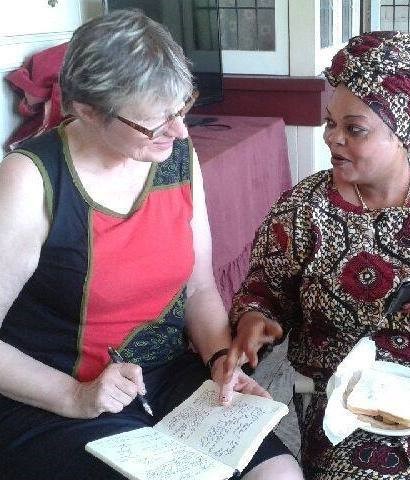For Jane Ingold, a reference and instruction librarian and archivist at Penn State Behrend’s John M. Lilley Library, one of the hardest things about doing an oral history is not turning it into a conversation. “The job of the interviewer is to ask a question and then be quiet,” Ingold said. “That can be hard for me, because I get excited about what they are saying and interrupt. I really have to avoid that temptation and let them do the talking.” For full story click here.
Blog
Deindustrialization and Populism
Twenty-four researchers and dozens of partner organizations will collaborate on an investigation into deindustrialization and its political consequences. The project, Deindustrialization and the Politics of our Time, will be based at Concordia’s Centre for Oral History and Digital Storytelling under the direction of Steven High, professor in the Department of History and founder of the centre. Read full story here.
Postcards from the Fire
Creative Arts Batemans Bay (CABBI) has launched a community healing project called Postcards from the Fire, in which anyone affected by the past summer’s bushfires can submit photos and stories. “Postcards is a virtual gallery on Instagram and Facebook of what the 2019-2020 bushfire season made of our world, as seen through the lenses of our community members,” said CABBI president Robert Creed. Read full story here.
Vietnam Veterans Project (USA)
“Paul Dostal is among 10 veterans from Hatfield who served in-country, along with one resident who was a nurse at Travis Air Force Base in California in the mid-1960s, whose stories are part of a Hatfield Historical Society online exhibit completed in time for Memorial Day. “I thought it would be a good way to preserve my history for my children and grandchildren and for future generations so they could learn from past mistakes,” Dostal said of his participation. “Hopefully, they will not make the same mistakes.” Full story here and website here.
COVID-19 stories (USA)
“We’re living through history. Just as we pore over photographs and narratives of people in the past, those in the future will be curious about what we’re doing right now, sheltered at home or on the front lines. We may have a responsibility to document our experiences, even if just for our own descendants.” This story about historical societies in USA are collecting items and voices about COVID-19, read more here.
More institutions in USA collecting for COVID-19 here. Also a document, COVID-19 capsule, which can be downloaded and completed for children and adults here.
Teachers and Oral History
“History happens every day in every place. Whether it be a bill passing in the halls of Congress or a television program playing in your living room, it all counts as the great and messy drama of the human experience, worthy of historical consideration. Yet given the current global crisis in the face of the Covid-19 pandemic, we are acutely aware of “history happening” in this particular moment, especially as New York City occupies the epicenter of the virus in the United States. Historians of the future will no doubt spend countless hours and pages analyzing the pandemic’s impact on politics, economics, and daily life—and we’re living right through this watershed moment.” Read more of this story and follow links here, some of which may be applied to Australian classrooms.
Amplify
Amplify has expanded to include oral history recordings at the State Library of Queensland. Learn more here.
Member Profile – Elena (Léna) Volkova
Elena (Léna) Volkova is a transmedia storytelling facilitator and producer, an oral historian, and a writer. She holds a Bachelor’s Degree in Literary Studies (Moscow State University, Russia), a Graduate Diploma in Museum Studies (Deakin University, Melbourne), and a Master’s Degree (Research) in Creative Industries (Queensland University of Technology, Brisbane).

The backdrop for her burgeoning interest in oral history was Literature and its Makers. She recorded stories of writers, poets, artists, and other significant Russian cultural figures, thus contributing to the creation of a ‘soundscape’ of Russian literature. Very soon, she embarked on recording life story interviews with the writers and artists – survivors of GULAG and WWII veterans. It was her own project; she was keen to find out how creativity survives in the dark places and how it provides a lifeline for those engaged in writing in the most unlikely places on Earth – the labour camps behind the Arctic Circle and the trenches of the Eastern front. She produced two vinyl discs of rear recordings and wrote several articles in the Folklore magazine.
In 1990, she was invited by the iconic Echo of Moscow to produce a weekly radio program on the history of literature. As a broadcaster and a journalist, she was solely responsible for all stages of production, including research, interviewing, editing, sound production, and broadcasting. Being a part of the Echo’s team was an honour and a challenge. She worked through two attempted military coups when the station was once surrounded by a barricade built by the ordinary Muscovites to protect their only ‘voice of freedom.’ By this time, she also realized that the unique radio heritage should be preserved, and in 1993 she established the Echo’s Sound Archive.
She did not plan to emigrate, but then life interfered. In Australia, she worked for the leading museums and universities and was an integral part of several ground-breaking projects in cultural ethnography, creative writing, and transmedia storytelling. The highlights of her career included projects Australians Caring for Refugees (exhibition curator, Queensland Museum), Russian monthly magazine Southern Cross (editor-in-chief), 4EB radio (co-presenter), Australian War Memorial (oral historian, commissioned), Australian Generations (oral historian, National Library of Australia/Radio National), The Difficult Return (research assistant, Griffith University/Australian Defence Force), and Developing Best Practice for Settlement Services for Refugee Women-at-Risk (digital stories’ producer, QUT).
Oral history principles and practice were in the heart of these projects, as in the exhibition Australians Caring for Refugees, where she introduced oral histories of the Brisbane-based refugees that she recorded and produced. They were a compelling element of the exhibition, which was described by media as innovative and eye-opening. Léna’s interviews with young diggers laid the foundation for the play The Return (ARC project The Difficult Return) performed in 2014 in BEMAC. Digital stories with women refugees that she produced in 2015 played an integral role in the success of the QUT project that investigated the mental health of the refugees. For several years Lena worked with the playwright Katherine Lyall-Watson contributing her research and interviews to the creation of the play Motherland. She was deeply moved when she discovered that Lyall-Watson featured her in this play as Alyona, a Russian literary scholar.
Léna joined the Oral History Association in 2006 and became the president of the Queensland branch in December 2007. She held this position for three years. During the time of her presidency, the website of the Queensland chapter was commissioned and created. It has become a portal for the members to stay abreast of the events, conferences, international and national projects, and scholarly articles in the field of oral history. Two successful grant applications allowed the committee to purchase much needed equipment for the use of Queensland oral historians, including state-of-the-art recorders, Sony video camera, Audio-Technica microphones, and headphones. The second grant allowed the Queensland branch to provide training for the rural/remote communities. Following the devastation caused by the Cyclone Yasi, the committee decided to give some of this equipment to the community of Cardwell to replenish their resources. Being Brisbane-based presented some challenges to the committee. One of them is being far away from the oral historians living in the Northern and Western parts of Queensland. Léna proposed approaching oral historians in these areas and appointing local members as the committee representatives to enable the branch to serve these communities in the best possible way.

In 2015 while still a student of the Creative Industries (QUT), Léna established her practice Story Labyrinths to enable people to create and produce personal stories spoken in their own voice. Her artistic practice reflects the way our modern society is engaged in the process of meaning-making through a multi-modal, multi-platform, co-creative, and collaborative work. She is a co-founder of Createplace – a collaborative group of experienced writing and arts health practitioners who offer a suite of programs in creative writing, poetry, digital storytelling, fairy tales, and mythology. The group aims to promote self-awareness and social connection and to provide tools for people to live more inspired, fulfilled, and enthusiastic lives. Léna’s latest project is Digilore, where she challenges her previous achievement as a scholar and attempts to turn oral history into an artistic pursuit.
Collecting COVID-19 Artifacts and Stories (USA)
“Numbers alone don’t always tell the whole story. In 100 years, what will future generations know about our collective coronavirus experience? Hopefully more than we know about the Spanish flu survivors, if special collections directors have anything to say about it.” Read this interesting article here.
Collecting COVID Oral Histories
“The COVID-19 pandemic may be just a few months old in the greater Detroit area, but the city’s principal memory box is already collecting oral histories and planning a memorial garden.” Read full story which includes link to the website here. Detroit people can upload a sound file up to 15 minutes long.
